Kenneth C. Davis's Blog, page 41
April 20, 2020
Join me for an online Event-April 28
On Tuesday, April 28th at 5pm we’re thrilled to present a special Northshire Live with guest author Kenneth C. Davis in conversation with fellow children’s non fiction author Steve Sheinkin.
Kenneth C. Davis is the New York Times bestselling author of Don’t Know Much About® History, which gave rise to the Don’t Know Much About® series of books for adults and children.
Davis will join us to discuss More Deadly Than War: The Hidden History of The Spanish Flu and the First World War. A Washington Post Best Children’s Book of the Month, More Deadly Than War is a riveting and timely exploration of the Spanish Flu pandemic of 1918.
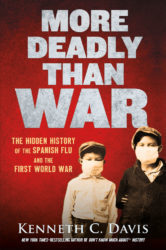
“Davis deftly juggles compelling storytelling, gruesome details, and historical context. More Deadly Than War reads like a terrifying dystopian novel—that happens to be true.” —Steve Sheinkin, author of Bomb and Undefeated
To join this event, get comfy at home with your computer (with webcam activated), smartphone, or tablet. Register here
April 15, 2020
“The American Contradiction: Conceived in Liberty, Born in Shackles”
My article in the March/April issue of Social Education, the journal of the National Council for the Social Studies, discusses how we must teach and talk about enslavement in American History. It starts with the fact that
•Enslaved people were in America before the Mayflower Pilgrims.

Thomas Jefferson’s Grave Marker at Monticello
America was conceived in liberty and born in shackles. This is the Great Contradiction at the heart of our nation’s story.
When the United States of America was founded in 1776, the Founding Fathers declared the lofty ideal of “all Men are created equal.” The Framers of the Constitution later set out to form a “more perfect Union” to secure “the Blessings of Liberty.”
–The American Contradiction: Conceived in Liberty, Born in Shackle” Social Education (March/April 2020)
My article in the March/April issue of Social Education, ...
My article in the March/April issue of Social Education, the journal of the National Council for the Social Studies, discusses how we must teach and talk about enslavement in American History. It starts with the fact that
•Enslaved people were in America before the Mayflower Pilgrims.

Thomas Jefferson’s Grave Marker at Monticello
America was conceived in liberty and born in shackles. This is the Great Contradiction at the heart of our nation’s story.
When the United States of America was founded in 1776, the Founding Fathers declared the lofty ideal of “all Men are created equal.” The Framers of the Constitution later set out to form a “more perfect Union” to secure “the Blessings of Liberty.”
–The American Contradiction: Conceived in Liberty, Born in Shackle” Social Education (March/April 2020)
April 14, 2020
Where is Herbert Hoover When We Need Him?
Why are we throwing away food when people are hungry?
That is the question raised by two stories dominating the front pages. There are “staggering food bank lines” across the country. The pandemic lockdown has outed the shameful truth of America’s food insecurity.
“These Photos Show Staggering Food Bank Lines Across America” (Mother Jones)
At the same time, farmers are dumping milk and plowing fields because their main customers –the commercial and institutional food service business – have essentially been shut down.
Dumped Milk, Smashed Eggs, Plowed Vegetables (New York Times)

A tractor mulches green beans at an R.C. Hatton farm in Florida. “It’s heartbreaking,” an owner of the farm said.Credit…Rose Marie Cromwell for The New York Times
So here’s the challenge. Why can’t we put food that is being produced and destroyed on the dinner tables of the hungry?
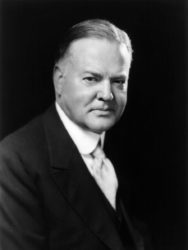
Herbert Hoover, 31st President, official portrait (Library of Congress)
Sounds like a job for Herbert Hoover.
Yes, that Herbert Hoover, the president who is usually associated with the tragic images of America’s Great Depression when homeless camps spread across the country were called “Hoovervilles.”
But it was Herbert Hoover who was credited with saving millions of lives during World War I. Orphaned as a child, Hoover was a self-made success in the field of mining and engineering. He had become a financier and began a career in philanthropy. In 1917, before the United States entered the war, Hoover was tasked with getting food into the mouths of starving people in a war zone. With agreements from combatants, Hoover organized a massive program of locating food surpluses and transporting them to Europe as the trench wars continued.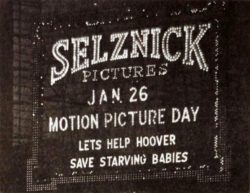
According to the Herbert Hoover Presidental Museum and Library, Hoover was named to head the U.S. Food Administration, which guided the effort to conserve resources and supplies and to feed America’s European allies.
“Hoover became a household name—‘to Hooverize’ meant to economize on food. Americans began observing ‘Meatless Mondays’ and ‘Wheatless Wednesdays’ and planting War Gardens.”
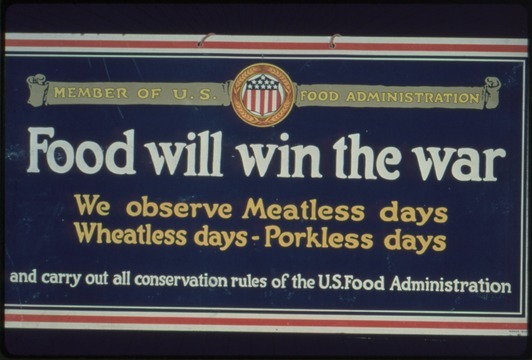
National Archives https://catalog.archives.gov/id/512516
He got money from governments and charity, sailed his own fleet which flew his flags, took over railways, set up a telegraph network, issued his own passports, made treaties with governments, negotiated safe passages through war zones on land and sea and saved countless lives.
It was not a charity he ran. It was an industry. It was almost a state.
A British diplomat remarked that Hoover had set up a ‘piratical state organised for benevolence.’
After the Armistice was signed in November 1918, President Wilson appointed Hoover to head the European Relief and Rehabilitation Administration. The situation in post-war Europe was dire. But Hoover was up to the job. Marshaling the needed resources, he channeled 34 million tons of American food, clothing, and supplies to war-torn Europe.
He then performed a miraculous job of feeding Russians in aftermath of the Russian Revolution that gave Lenin’s Bolsheviks control of the future Soviet Union.
Surely today, a nation that can deliver groceries overnight and summon a stranger in a car to pick us up on a street corner can figure out the logistics. Pay the farmers for their crops. Get the milk and produce into the hands of the people who can prepare it. That means jobs and income for some, and a decent meal for others.
The high priest of “Rugged Individualism,” Herbert Hoover was no Socialist or friend of Communism. But he was a man of honor who would not allow millions to starve to death. And the United States had the will.
He did it. We can do it.
April 13, 2020
Who Said it (4/13/20)
Thomas Jefferson, in 1820, discussing the fate of the Missouri Compromise –legislation which was supposed to resolve the question of the future of slavery’s extension in America.
Read more about Jefferson in this post.
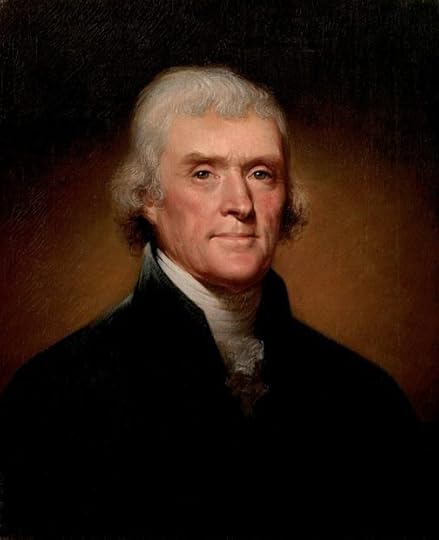
Thomas Jefferson, third president of the United States.Official portrait by Rembrandt Peale. http://www.whitehouseresearch.org/ass...
“But as it is, we have the wolf by the ear, and we can neither hold him, nor safely let him go. Justice is in one scale, and self-preservation in the other.”
Jefferson discussing the Missouri question and slavery to John Holmes April 22, 1820. Ford, Paul Leicester, ed. The Works of Thomas Jefferson, Volume 12. New York: G.P. Putnam’s Sons, 1905, p. 159.
Don’t Know Much About® Thomas Jefferson
(Original post of 2011; revised April 13, 2020)
Among America’s iconic Founding Fathers, is there a more complicated and contradictory figure than Thomas Jefferson?
Scientist, humanist, Enlightenment thinker, writer, architect, politician. He was all these things. The confusion over this genius comes from one basic question: How could the man who wrote, “All Men are Created Equal” and “Life, Liberty and the Pursuit of Happiness” go home to a Monticello plantation, completely dependent upon enslaved labor?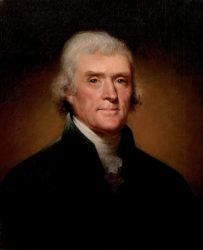
Even Jefferson’s birthday is confusing. History books say he was born on April 13,1743. But the grave marker at Monticello says he was born on April 2. That one is easier to answer than some of the larger contradictions in Jefferson’s life. Jefferson was born while the old Julian calendar was still in use in Protestant England and its American colonies. So the April 2 date is called “Old Style” (O.S.). When Great Britain and America finally came around and adopted the Gregorian (named for Pope Gregory) Calendar in 1758, Jefferson’s birth date was changed to April 13.
Birth date aside, Thomas Jefferson more than anyone embodies the “Great Contradiction” in American history. How could a nation dedicated to ideals of freedom and liberty continue a system that enslaved human beings in the cruelest of ways?
That contradiction is nowhere more evident than in Jefferson’s original draft of Declaration of Independence.
A few years ago, at the New York Public Library, I had the thrill of seeing Jefferson’s handwritten copy of his original draft of the Declaration of Independence. We may take the words for granted now. But Jefferson gave full voice to the idea that we all possess “inalienable rights.” That we are “created equal.” That we have basic rights to “life, liberty and the pursuit of happiness.” That governments exist to advance those human rights, and only with the “consent of the governed.”

“Fair Copy” of The Declaration of Independence (Source: New York Public Library)
This document was written on both sides of two pieces of paper. In his careful, flowing script, Jefferson included all of his original wording to show what the Congress in Philadelphia had changed, underscoring words and phrases that had been deleted. Those alterations, Jefferson, thought were “mutilations.” Distressed by the editing, he made these “fair copies” of his original some time after July 4th.
The most startling of these changes is a paragraph about what Jefferson calls “this execrable commerce” — slavery. Jefferson charged that King George III was responsible for the slave trade and was preventing American efforts to restrain that trade. The section was deleted completely. But it is striking to see Jefferson’s bold, block lettering when he describes:
an open market where MEN should be bought & sold
He clearly wanted to underscore his belief that enslaved people were “MEN.”
The contradiction is troubling and difficult to resolve. Jefferson knew slavery was wrong. He believed, like fellow slaveholder George Washington, that it would end. But both were inextricably tied to a society and economy, built on enslavement, even though they believed that the “peculiar institution” would gradually die out.
Of course, part of the cynicism in Jefferson’s case is due to the relationship between Jefferson and an enslaved woman Sally Hemings. Monticello now acknowledges that relationship existed, a contention first raised publicly in 1802 by muckraking newspaperman James Callender. In recent years, Monticello has also gone a long way in addressing the question of enslaved life at the plantation.
Jefferson, who died on July 4, 1826 –the 50th anniversary of the adoption of the Declaration– and his deep contradictions are the perfect reminder that politicians are people –even the marble gods like Washington and Jefferson. Their all-too human flaws are proof of that as well as the fact that history books once tried to hide these flaws by pointing to the past with pride and patriotism.
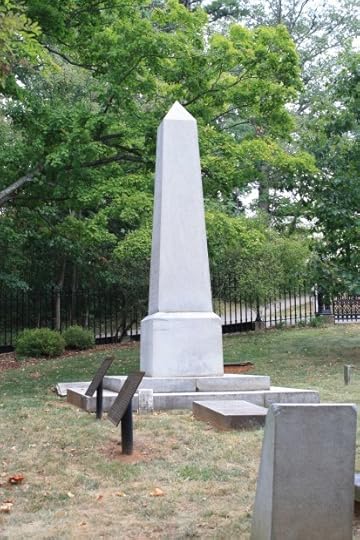
Thomas Jefferson’s Grave Marker at Monticello (Photo: Kenneth C. Davis, 2010)
Those flaws are explored in several of my books, including Don’t Know Much About History, Don’t Know Much About the Civil War and most recently, In the Shadow of Liberty: The Hidden History of Slavery, Four Presidents and Five Black Lives.
April 10, 2020
Who is “An Enemy of the People?”
We have reached our Dr. Stockman moment.
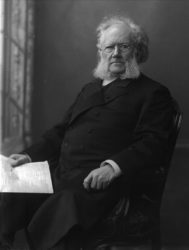
Henrik Ibsen by Gustava Borgen (public Domain via Wikimedia)
In Ibsen’s classic drama, An Enemy of the People, Dr. Thomas Stockman has discovered that the waters in his town’s famed spa are poisoning the guests. He pleads with his brother, the Mayor, to close the lucrative attraction. But Mayor Peter Stockman refuses to shut down and repair the toxic baths.
“Have you taken the trouble to consider what your proposed alterations would cost?” the Mayor asks his brother. “And do you suppose anyone would come near the place after it had got about that the water was dangerous?”[1]
And there it is. Ibsen brings us to that place where economic health trumps public health.
Sound familiar? It should. Because we face a similar conflict today. A president and his administration are pushing to “reopen” the economy despite express warnings from medical experts about the perils of premature action.[2]
We have been down this road before. This is not the first time that the common good and the bottom line have faced off. In the midst of one pandemic, we need only look to the history of the 1918 pandemic, a story told in my book More Deadly Than War.
What was later called the Spanish flu emerged in March 1918, blossoming into an epidemic on army bases where young Americans were training for Europe’s trenches. After slacking in summertime, the outbreak returned in a second wave, even more swift and lethal, hitting American ports like Boston in September 1918. Striking down soldiers and sailors by the thousands, it jumped from the military to the civilian population. Seeing “bodies stacked like cordwood,” army doctors wondered if they were witnessing a new plague. The Spanish flu was carried to other ports and military bases, including those near Philadelphia.
But to Philadelphia’s civil authorities, it was “just the flu.” And Philadelphia was planning a parade – a grandiose show of patriotism and pride to promote the sale of Liberty Loans. These war bonds were marketed through an intense nationwide propaganda campaign that made buying these bonds an act of allegiance. Woe to those “slackers” who didn’t “do their part.”
Read Philadelphia Threw a WWI Parade That Gave Thousands of Onlookers the Flu
As Philadelphia planned its spectacle, the city’s director of public health knew better. A gynecologist, and an appointee loyal to Philadelphia’s notoriously corrupt political machine, Dr. Wilmer Krusen was warned to cancel the parade. But Dr. Krusen allowed the show to go on. He assured the public that recent military deaths were from “old-fashioned influenza or grip.”[3] His words were a harbinger of the president’s in January. “It’s one person coming in from China, and we have it under control. It’s going to be just fine.”[4]
It wasn’t. As the parade got underway on September 28, 1918, some 200,000 people jammed Philadelphia’s main street, packed eight deep on the sidewalks. Within seventy-two hours of that parade, every bed in Philadelphia’s hospitals was filled.[5]
On October 3, most public spaces –schools, churches, theaters, and pool halls –were officially closed.[6] The delayed lockdown to “flatten the curve” was too little, too late for many in the City of Brotherly Love. Within weeks, more than 12,000 people died in Philadelphia before the epidemic crested there.
Dr. Krusen was aware of the risks posed when he allowed the parade to step off. But he was answering to political and economic concerns, much like the Mayor in Ibsen’s play, and so many economists and administration officials echoing the president’s call to reopen the economy.
History is replete with Dr. Krusen’s counterparts—those scientists and other people who dared challenge authority. Take Giordano Bruno for example. Born in 1548, Bruno became a priest and a learned mathematician. But he was also a free thinker and, in 1584, published his concept that the sun, not the earth, was at the center of Creation.
Bruno was arrested and tried for this and other heresies during the Inquisition. Refusing to recant, the rebellious priest was sentenced as an impenitent heretic on papal orders. In February 1600, he was taken to the Campo de’ Fiori, an open market in Rome, his tongue in a gag, and burned alive.
Today, there is a statue honoring Giordano Bruno in the Campo de’ Fiori. There are no statues of Dr. Krusen. In modern parlance, Bruno was an “Upstander,” Dr. Krusen a “Collaborator.”
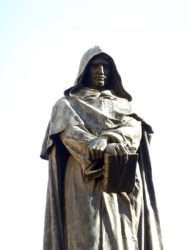
Close up of the statue of Giordano Bruno in the Camp de Fiori, Rome (Public Domain Wikipedia Commons)
Giordano Bruno would not serve a master who demanded that he deny the science that contradicted faith. He served the truth. Dr. Stockman refused to serve a master who placed profits over life and was ultimately branded “an enemy of the people.” Dr. Krusen chose instead to answer to his political masters.
This is the essential question now facing both American leadership and every individual. If we are to survive the current coronavirus, we need to carefully choose and serve a worthy master.
TEACHERS: If you would like a virtual visit to discuss this topic or any of my work, please get in touch with me. Here’s the link: Contact page.
[1] Henrik Ibsen, An Enemy of the People, Act II.
[2] https://www.washingtonpost.com/nation...
[3] John M. Barry, The Great Influenza, p. 204
[4] https://www.nytimes.com/2020/03/15/op...
[5] Gina Kolata, Flu, p. 20.
[6] Barry, p. 220.
March 26, 2020
“A lover’s quarrel with the world”-Robert Frost
In honor of his birthday on March 26, 1874, a video tribute to Robert Frost. (Originally published August 2009; video edited and created by Colin Davis. One correction: I no longer have a home in Vermont mentioned in the video, but have not lost my admiration for Robert Frost.)
I had a lover’s quarrel with the world
Robert Frost’s epitaph

Robert Frost (Courtesy Library of Congress)
One of my favorite places in Vermont is the Frost grave-site in the cemetery of the First Church in Old Bennington -just down the street from the Bennington Monument. This video was recorded there.
Apples, birches, hayfields and stone walls; simple features like these make up the landscape of four-time Pulitzer Prize winner Robert Frost’s poetry. Known as a poet of New England, Frost (1874-1963) spent much of his life working and wandering the woods and farmland of Massachusetts, Vermont, and New Hampshire. As a young man, he dropped out of Dartmouth and then Harvard, then drifted from job to job: teacher, newspaper editor, cobbler. His poetry career took off during a three-year trip to England with his wife Elinor where Ezra Pound aided the young poet. Frost’s language is plain and straightforward, his lines inspired by the laconic speech of his Yankee neighbors.
But while poems like “Stopping by Woods on a Snowy Evening” are accessible enough to make Frost a grammar-school favorite, his poetry is contemplative and sometimes dark—concerned with themes like growing old and facing death. One brilliant example is this poem about a young boy sawing wood, Out, out–
The buzz-saw snarled and rattled in the yard
And made dust and dropped stove-length sticks of wood,
The first poet invited to speak at a Presidential inaugural, Frost told the new President:
Be more Irish than Harvard. Poetry and power is the formula for another Augustan Age. Don’t be afraid of power.
A brief biography of Robert Frost can be found at Poets.org, where there are more samples of his poetry. It includes an account of Frost and JFK.
Robert Frost died on January 29, 1963. He had written his own epitaph, “I had a lover’s quarrel with the world,” etched on his headstone in a church cemetery in Bennington, VT.
Here is the NYTimes obituary published after his death.
This material is adapted from Don’t Know Much About Literature written in collaboration with Jenny Davis.
March 25, 2020
“Have Americans Forgotten the History of this Deadly Flu?”
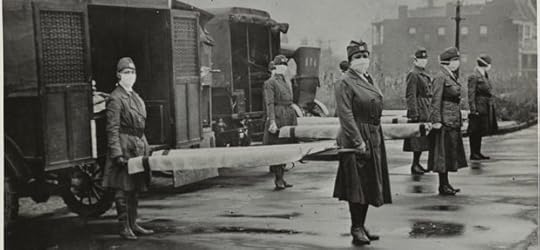
Members of the St. Louis Red Cross Motor Corps on duty on five ambulances during the 1918 flu pandemic. Via Library of Congress
This is from a PBS interview that ran in November 2018 about the impact of the Spanish Flu and the possibility of another pandemic outbreak. This is the subject of my book More Deadly Than War. As I said at the time,
Could this happen again? The answer is, of course. And I’m sure there are people at the CDC who probably have nightmares about this. But we are much better prepared than we were 100 years ago. We would possibly have a vaccine that would work against such a virus, if it were identified and produced in massive numbers quickly enough.
We have erected enormous guardrails around the world through international cooperation, the World Health Organization, perhaps one of the most effective parts of the United Nations. Those guardrails are weakened when we deny science, when we ignore sound medical advice for short-term political considerations.

Read more of the interview here:
“In autumn of 1918, the largest military offensive in American history was raging on Europe’s Western Front. The battle concluded on Nov. 11, 1918, when the Armistice with Germany was signed, ending what was known as the Great War.
But more U.S. soldiers died of disease (63,114), primarily from the Spanish flu, than in combat (53,402).
Overall, 675,000 Americans were killed by the Spanish flu. This number surpasses the total of U.S. soldiers killed in World War I, World War II, the Korean War and Vietnam War combined. Current day estimates put the death toll from the 1918-1919 outbreak of the Spanish flu between 80 to 100 million worldwide.”
You can also read my article in Smithsonian, “Philadelphia Threw a WWI Parade That Gave Thousands of Onlookers the Flu.”
March 24, 2020
Don’t Know Much About® the Triangle Shirtwaist Fire
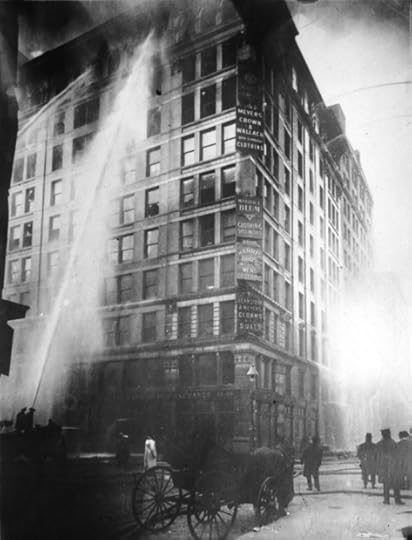
Triangle Shirtwaist Factory fire on March 25, 1911 from front page of The New York World (Source: [Post revised from original on 3/25/2011]Cornell University ILR School Kheel Center © 2011)
[Reposted from original on 3/25/2011]Can anything positive or hopeful emerge from a terrible tragedy? That is a question we are all pondering in March 2020 as a pandemic sweeps the United States and the world. We are also asking about the human costs of “business as usual.”
It is a moment to consider of one of the great tragedies of American history.
On this date, March 25, 1911, the Triangle Shirtwaist Factory in New York caught fire and 146 people died, most of them women between the ages of 16 and 23.
“Look for the union label.”
If you are of a certain generation, you may recognize those words instantly. They are the first line of a song that became a 1970s advertising icon.
Sung by a swelling chorus of lovely ladies (and a few men) of all colors, shapes and sizes, it was the anthem of the International Ladies Garment Workers Union.
Airing as American unions began to confront the long, steady drain of jobs to cheaper foreign labor markets, the song rousingly implored us to look for the union label when shopping for clothes (“When you are buying a coat, dress or blouse”).
Seeing these earnest women, thinking of them at their sewing machines, made us race to the closet and check our clothes for that ILGWU tag. (“It says we’re able to make it in the USA.”)
The International Ladies Garment Worker Union was born in 1900, in the midst of the often-violent period of early 20th century labor organizing when brutal working conditions and child labor were the norm in America’s mines and factories.
One of the companies the union attempted to organize was the Triangle Shirtwaist Factory at what is now Greene Street and Washington Place in New York’s Greenwich Village. It employed many poor and mostly immigrant women, most of them Jewish and Italian.
A walkout against the firm in 1909 helped strengthen the union’s rolls and led to a union victory in 1910. But the Triangle Shirtwaist Company –which would chain its doors shut to control its workers— earned infamy when a fire broke out on March 25, 1911 and 146 workers were trapped in the flaming building and died. Some jumped to their deaths.
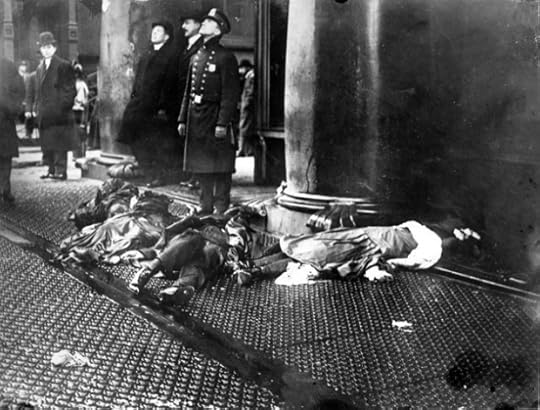
A police officer and others with the broken bodies of Triangle fire victims at their feet, look up in shock at workers poised to jump from the upper floors of the burning Asch Building. (Credit: Cornell University ILR School Kheel Center ©2011)
The two owners of the factory were indicted but found not guilty. The tragedy helped galvanize the trade union movement and especially the ILGWU.
On this anniversary of that dreadful event, it is worth remembering that American prosperity was built on the sweat, tears and blood of working men and women. Immigration and jobs are the issue again today, just as they were more than a century ago.
Cornell University’s Kheel Center for Labor-Management Documentation offers a web exhibit on the Triangle Factory Fire. The Library of Congress also offers numerous resources on the tragedy.
On February 28, 2011, American Experience on PBS aired a documentary film about the tragedy and the period.
The site is part of New York University and a National Historic Landmark.



